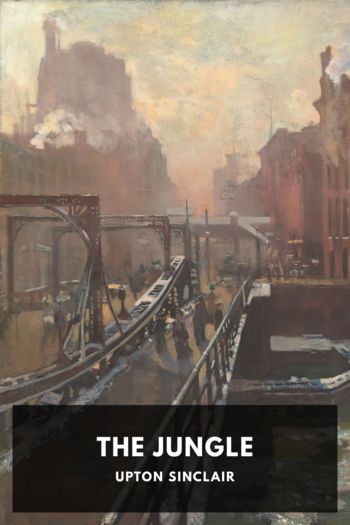Arrowsmith by Sinclair Lewis (learn to read books txt) 📕

- Author: Sinclair Lewis
Book online «Arrowsmith by Sinclair Lewis (learn to read books txt) 📕». Author Sinclair Lewis
Again it was Sondelius who got Ira Hinkley out, not too discontented, while Martin could only sputter, “Now how do you suppose that maniac ever got here? This is going to be awful!”
Before Inchcape Jones returned, the Commission ventured out for their first sight of the town … A Scientific Commission, yet all the while they were only boisterous Gustaf and doubtful Martin and casual Leora.
The citizens had been told that in bubonic plague, unlike pneumonic, there is no danger from direct contact with people developing the disease, so long as vermin were kept away, but they did not believe it. They were afraid of one another, and the more afraid of strangers. The Commission found a street dying with fear. House-shutters were closed, hot slatted patches in the sun; and the only traffic was an empty trolley-car with a frightened motorman who peered down at them and sped up lest they come aboard. Grocery shops and drugstores were open, but from their shady depths the shopkeepers looked out timidly, and when the Commission neared a fish-stall, the one customer fled, edging past them.
Once a woman, never explained, a woman with wild ungathered hair, ran by them shrieking, “My little boy—”
They came to the market, a hundred stalls under a long corrugated-iron roof, with stone pillars bearing the fatuous names of the commissioners who had built it—by voting bonds for the building. It should have been buzzing with jovial buyers and sellers, but in all the gaudy booths there were only one Negress with a row of twig besoms, one Hindu in gray rags squatting before his wealth of a dozen vegetables. The rest was emptiness, and a litter of rotted potatoes and scudding papers.
Down a grim street of coal yards, they found a public square, and here was the stillness not of sleep but of ancient death.
The square was rimmed with the gloom of mango trees, which shut out the fainthearted breeze and cooped in the heat—stale lifeless heat, in whose misery the leering silence was the more dismaying. Through a break in the evil mangoes they beheld a plaster house hung with black crape.
“It’s too hot to walk. Perhaps we’d better go back to the hotel,” said Leora.
IVIn the afternoon Inchcape Jones appeared with a Ford, whose familiarity made it the more grotesque in this creepy world, and took them to Penrith Lodge, on the cool hills behind Blackwater.
They traversed a packed native section of bamboo hovels and shops that were but unpainted, black-weathered huts, without doors, without windows, from whose recesses dark faces looked at them resentfully. They passed, at their colored driver’s most jerky speed, a new brick structure in front of which stately Negro policemen with white gloves, white sun-helmets, and scarlet coats cut by white belts, marched with rifles at the carry.
Inchcape Jones sighed, “Schoolhouse. Turned it into pesthouse. Hundred cases in there. Die every hour. Have to guard it—patients get delirious and try to escape.”
After them trailed an odor of rotting.
Martin did not feel superior to humanity.
VWith broad porches and low roof, among bright flamboyants and the cheerful sago palms, the bungalow of Penrith Lodge lay high on a crest, looking across the ugly flat of the town to the wash of sea. At its windows the reed jalousies whispered and clattered, and the high bare rooms were enlivened by figured Carib scarfs … It had belonged to the Port-doctor, dead these three days.
Inchcape Jones assured the doubtful Leora that she would nowhere else be so safe; the house was rat-proofed, and the doctor had caught the plague at the pier, had died without ever coming back to this well-beloved bungalow in which he, the professional bachelor, had given the most clamorous parties in St. Hubert.
Martin had with him sufficient equipment for a small laboratory, and he established it in a bedroom with gas and running water. Next to it was his and Leora’s bedroom, then an apartment which Sondelius immediately made homelike by dropping his clothes and his pipe ashes all over it.
There were two colored maids and an ex-soldier butler, who received them and unpacked their bags as though the plague did not exist.
Martin was perplexed by their first caller. He was a singularly handsome young Negro, quick-moving, intelligent of eye. Like most white Americans, Martin had talked a great deal about the inferiority of Negroes and had learned nothing whatever about them. He looked questioning as the young man observed:
“My name is Oliver Marchand.”
“Yes?”
“Dr. Marchand—I have my M.D. from Howard.”
“Oh.”
“May I venture to welcome you, Doctor? And may I ask before I hurry off—I have three cases from official families isolated at the bottom of the hill—oh, yes, in this crisis they permit a Negro doctor to practice even among the whites! But—Dr. Stokes insists that D’Herelle and you are right in calling bacteriophage an organism. But what about Bordet’s contention that it’s an enzyme?”
Then for half an hour did Dr. Arrowsmith and Dr. Marchand, forgetting the plague, forgetting the more cruel plague of race-fear, draw diagrams.
Marchand sighed, “I must





Comments (0)